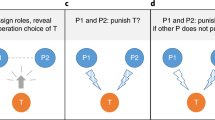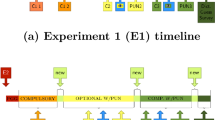Abstract
In the past decade, experiments on altruistic punishment have played a central role in the study of the evolution of cooperation. By showing that people are ready to incur a cost to punish cheaters and that punishment help to stabilise cooperation, these experiments have greatly contributed to the rise of group selection theory. However, despite its experimental robustness, it is not clear whether altruistic punishment really exists. Here, I review the anthropological literature and show that hunter-gatherers rarely punish cheaters. Instead, they avoid dealing with them and switch to other partners. I suggest that these data are better explained by individual selection, and in particular by partner choice models, in which individuals are in competition to be recruited by cooperative partners. I discuss two apparent problems for partner choice theories: large-scale cooperation and punishments in economic games. I suggest that rather than favouring group selection theory, these two phenomena provide evidence in favour of individual selection: (1) people produce large-scale cooperation through institutions in which punishment is not altruistic but rewarded on an individual basis; (2) punishment in experimental games can be explained without altruism and is indeed often better explained by individual interests.
Similar content being viewed by others
Notes
This theory raises the problem of second-order punishment (some individuals may free-ride the cost of punishment by contributing to the common good but refusing to punish those who do not cooperate). Boyd et al. have proposed a solution (Boyd et al. 2003). We will see in Sect. 2.2 that this solution is empirically implausible.
Among the Inuits, as a double safeguard against blood revenge on the executioner, close kinsmen may themselves be called upon to carry out the community will (Hoebel, 1954).
These associations are widespread in countries where access to credit is difficult. They are made up of individuals who agree to make regular contribution to a fund that is given, in whole or in part, to each contributor in rotation.
Group selection supporters also claim that group selection is necessary to explain the emergence of large-scale institutions (and not only their stabilization through punishment). Good institutions would flourish and out-compete bad institutions. However, common pool resources are just the cases that contradict this point. Indeed, as Ostrom shows, each institution with its rules, its symbols, its participants, is precisely adapted to its environment. It cannot travel easily and replace another institution. Moreover, empirical studies clearly show that institutions do not evolve by mutation and selection but rather by adjustment and conflict resolution.
When appropriators design at least some of their own rules (design principle 3), they can learn from experience to craft enforceable rather than unenforceable rules. This means paying attention to the costs of monitoring and enforcing, as well as the benefits that accrue to those who monitor and enforce the rules. (p. 96).
The same analysis can be used for the Prisoners’ Dilemma (Dreber et al. 2008; Wu et al. 2009). In each round, participants chose between cooperating, defecting, or punishing the other participant. Here punishment is not altruistic, since individuals are directly involved in the interactions and may benefit considerably from threatening their partners. By punishing, they show their partner that they are not going to allow themselves to be exploited in the following rounds. Again, this behaviour may have been adaptive in the ancestral environment, where it was not uncommon to interact again and again with the same individuals.
References
Aktipis C (2004) Know when to walk away: contingent movement and the evolution of cooperation. J Theor Biol 231(2):249–260
Ardener S (1964) The comparative study of rotating credit associations. J Anthropol Inst Great Britain Irel 94(2):201–229
Axelrod R (1984) The evolution of cooperation. Basic Books, New York
Axelrod R, Hamilton W (1981) The evolution of cooperation. Science 211(4489):1390–1396
Balikci A, American Museum of Natural History (1970) The Netsilik Eskimo, 1st edn. Natural History Press, Garden City
Barclay P (2004) Trustworthiness and competitive altruism can also solve the “tragedy of the commons”. Evol Hum Behav 25(4):209–220
Barclay P (2006) Reputational benefits for altruistic punishment. Evol Hum Behav 27:325–344
Barclay P, Willer R (2007) Partner choice creates competitive altruism in humans. Proc Biol Sci 274(1610):749–753
Baron J, Ritov I (2008) The role of probability of detection in judgments of punishment. Unpublished manuscript
Baron J, Gowda R, Kunreuther H (1993) Attitudes toward managing hazardous waste: what should be cleaned up and who should pay for it? Risk Anal 13(2):183–192
Baumard N (2008) A naturalist and mutualist theory of morality. Ecole Normale Supérieure, Paris
Baumard N (2010a) L’origine de la morale Une histoire naturelle du bien et du mal. Odile Jacob, Paris
Baumard N (2010b) Punishment is a group adaptation. Mind Soc. doi:10.1007/s11299-010-0080-3
Baumard N, Boyer P, Sperber D (2010) Evolution of fairness: cultural variability. Science 329(5990):388
Bernhard H, Fischbacher U, Fehr E (2006) Parochial altruism in humans. Nature 442(7105):912–915
Bernstein L (1992) Opting out of the legal system: extralegal contractual relations in the diamond industry. J Legal Stud 21(1):115–157
Black D (2000) On the origin of morality. In: Katz L (ed) Evolutionary origins of morality: cross-disciplinary perspectives (pp. xvi, 352 p.). Imprint Academic, Thorverton
Boehm C (1999) Hierarchy in the forest: the evolution of egalitarian behavior. Harvard University Press, Cambridge
Bolton G, Zwick R (1995) Anonymity versus punishment in ultimatum bargaining. Games Econ Behav 10(1):95–121
Boyd R, Richerson P (1988) The evolution of reciprocity in sizable groups. Theor Biol 132(3):337–356
Boyd R, Richerson P (2002) Group beneficial norms can spread rapidly in a structured population. J Theor Biol 215(3):287–296
Boyd R, Gintis H, Bowles S, Richerson P (2003) The evolution of altruistic punishment. Proc Natl Acad Sci USA 100(6):3531–3535
Boyd R, Gintis H, Bowles S (2010) Coordinated punishment of defectors sustains cooperation and can proliferate when rare. Science 328(5978):617
Briggs JL (1970) Never in anger: portrait of an Eskimo family. Harvard University Press, Cambridge
Brosig J (2002) Identifying cooperative behavior: some experimental results in a prisoner’s dilemma game. J Econ Behav Organ 47(3):275–290
Bshary R, Noë R (2003) The ubiquitous influence of partner choice on the dynamics of cleaner fish–client reef fish interactions. In: Hammmerstein P (ed) Genetic and cultural evolution of cooperation. MIT, Cambridge, pp 167–184
Bull J, Rice W (1991) Distinguishing mechanisms for the evolution of co-operation. J Theor Biol 149(1):63
Carlsmith K, Darley J, Robinson P (2002) Why do we punish? Deterrence and just deserts as motives for punishment. J Pers Soc Psychol 83(2):284–299
Cashdan E (1980) Egalitarianism among hunters and gatherers. Am Anthropol 82(1):116–120
Chiang Y (2010) Self-interested partner selection can lead to the emergence of fairness. Evol Hum Behav 31(4):265–270
Cinyabuguma M, Page T, Putterman L (2004) On perverse and second-order punishment in public goods experiments with decentralized sanctioning. Working paper, Department of Economics, Brown University
Clastres P (1972) Chronique des Indiens Guayaki; ce que savent les Aché, chasseurs nomades du Paraguay. Plon, Paris
Clutton-Brock T, Parker G (1995) Punishment in animal societies. Nature 373(6511):209–216
Coricelli G, Fehr D, Fellner G (2004) Partner selection in public goods experiments. J Conflict Resolut 48(3):356–378
Darley J, Carlsmith K, Robinson P (2000) Incapacitation and just deserts as motives for punishment. Law Hum Behav 24(6):659–683
Dawes CT, Fowler JH, Johnson T, McElreath R, Smirnov O (2007) Egalitarian motives in humans. Nature 446(7137):794–796
de Quervain DJ, Fischbacher U, Treyer V, Schellhammer M, Schnyder U, Buck A et al (2004) The neural basis of altruistic punishment. Science 305(5688):1254–1258
Denant-Boemont L, Masclet D, Noussair C (2007) Punishment, counterpunishment and sanction enforcement in a social dilemma experiment. J Econ Theory 33(1):145–167
Dreber A, Rand D, Fudenberg D, Nowak M (2008) Winners don’t punish. Nature 452(7185):348–351
Durkheim É (1893) De la division du travail social. F. Alcan, Paris
Ehrhart K-M, Keser C (1999) Mobility and cooperation: on the run. Série scientifique (CIRANO);99s-24
Evans-Pritchard EE (1940) The Nuer, a description of the modes of livelihood and political institutions of a Nilotic people. The Clarendon, Oxford
Falk A, Fehr E, Fischbacher U (2005) Driving forces behind informal sanctions. Econometrica 73:2017–2030
Fehr E, Fischbacher U (2003) The nature of human altruism. Nature 425(6960):785–791
Fehr E, Fischbacher U (2004) Social norms and human cooperation. Trends Cogn Sci 8(4):185–190
Fehr E, Gächter S (2002) Altruistic punishment in humans. Nature 415:137–140
Frank R, Gilovich T, Regan D (1993) The evolution of one-shot cooperation: an experiment. Ethol Sociobiol 14:247–250
Fürer-Haimendorf Cv (1967) Morals and merit: a study of values and social controls in South Asian societies. Weidenfeld & Nicolson, London
Gintis H (2009) The bounds of reason: game theory and the unification of the behavioral sciences. Princeton University Press, Princeton
Gintis H, Bowles S, Boyd R, Fehr E (2003) Explaining altruistic behavior in humans. Evol Hum Behav 24(3):153–172
Gintis H, Bowles S, Boyd R, Fehr E (2005) Moral sentiments and material interests: origins, evidence, and consequences. In: Moral sentiments and material interests: the foundations of cooperation in economic life, pp 3–39
Glaeser EL, Sacerdote B (2000) The determinants of punishment: deterrence, incapacitation and vengeance. SSRN
Greif A (1993) Contract enforceability and economic institutions in early trade: the maghribi traders’ coalition. Am Econ Rev 83(3):525–548
Gurven M (2004) To give and to give not: the behavioral ecology of human food transfers. Behav Brain Sci 27:543–559
Hardin G (1968) The tragedy of the commons. Science 162:1243–1248
Hardy CL, Van Vugt M (2006) Nice guys finish first: the competitive altruism hypothesis. Pers Soc Psychol Bull 32(10):1402
Hechter M (1987) Principles of group solidarity. University of California Press, Berkeley
Hechter M, Kanazawa S (1993) Group solidarity and social order in Japan. J Theor Polit 5(4):455–493
Henrich J, Boyd R (2001) Why people punish defectors: weak conformist transmission can stabilize costly enforcement of norms in cooperative dilemmas. J Theor Biol 208:79–89
Henrich J, McElreath R, Barr A, Ensminger J, Barrett C, Bolyanatz A et al (2006) Costly punishment across human societies. Science 312(5781):1767–1770
Henrich J, Ensminger J, McElreath R, Barr A, Barrett C, Bolyanatz A et al (2010) Markets, religion, community size, and the evolution of fairness and punishment. Science 327(5972):1480
Herrmann B, Gächter S, Thöni C (2008) Antisocial punishment across societies. Science 319: 1362
Hoebel EA (1954) The law of primitive man: a study in comparative legal dynamics. Harvard University Press, Cambridge
Johnson T, Dawes C, Fowler J, McElreath R, Smirnov O (2009) The role of egalitarian motives in altruistic punishment. Econ Lett 102(3):192–194
Kaplan H, Gurven M (2001) The natural history of human food sharing and cooperation: a review and a new multi-individual approach to the negotiation of norms paper presented at the conference on the structure and evolution of strong reciprocity, Santa Fe Institute
Knauft B (1987) Reconsidering violence in simple human societies: homicide among the Gebusi of New Guinea. Curr Anthropol 28(4):457–500
Kurzban R, DeScioli P (2008) Reciprocity in groups: information-seeking in a public goods game. Eur J Soc Psychol 38(1):139
Kurzban R, DeScioli P (2009) Adaptationist punishment in humans. Context
Kurzban R, DeScioli P, O’Brien E (2006) Audience effects on moralistic punishment. Working paper
Landa JT (1981) A theory of the ethnically homogeneous middleman group: an institutional alternative to contract law. J Legal Stud 10(2):349–362
Lee RB (1979) The !Kung San: men, women, and work in a foraging society. Cambridge University Press, Cambridge
Leibbrandt A, López-Pérez R (2008) The envious punisher. Working paper, University of Zurich
Malinowski B (1926/1985) Crime and custom in savage society. Rowman & Littlefield, New York
McFatter RM (1982) Purposes of punishment: effects of utilities of criminal sanctions on perceived appropriateness. J Appl Psychol 67(3):255
Nikiforakis N (2008) Punishment and counter-punishment in public good games: can we really govern ourselves? J Public Econ 92(1–2):91–112
Noë R, van Schaik C, Van Hooff J (1991) The market effect: an explanation for pay-off asymmetries among collaborating animals. Ethology 87(1–2):97–118
Ohtsubo Y, Watanabe E (2008) Do sincere apologies need to be costly? Test of a costly signaling model of apology. Evol Hum Behav 30(2):114–123
Olson M (1965) The logic of collective action; public goods and the theory of groups. Harvard University Press, Cambridge
Ostrom E (1990) Governing the commons: the evolution of institutions for collective action. Cambridge University Press, Cambridge
Page T, Putterman L, Unel B (2005) Voluntary association in public goods experiments: reciprocity, mimicry and efficiency. Econ J 115(506):1032–1053
Polinsky AM, Shavell S (2000) The economic theory of public enforcement of law. J Econ Lit 38(1):45–76
Posner R (1983) The economics of justice. Harvard University Press, Cambridge
Pradel J, Euler HA, Fetchenhauer D (2008) Spotting altruistic dictator game players and mingling with them: the elective assortation of classmates. Evol Hum Behav 30(2):103–113
Price ME (2005) Punitive sentiment among the Shuar and in industrialized societies: cross-cultural similarities. Evol Hum Behav 26:279–287
Radcliffe-Brown AR (1922) The Andaman islanders: a study in social anthropology. The University press, Cambridge
Rand D, Dreber A, Ellingson T, Fudenberg D, Nowak M (2009) Positive interactions promote public cooperation. Science 325(5945):1272–1275
Roberts G (1998) Competitive altruism: from reciprocity to the handicap principle. Proc R Soc Lond B 265:427–431
Roberts J, Gebotys R (1989) The purposes of sentencing: public support for competing aims. Behav Sci Law 7(3):387–402
Rouland N (1976) La Sanction du droit chez certaines populations esquimaudes: problèmes théoriques et modes d’intervention de la communauté dans les procédures de règlement des conflit. Centre d’Etude Arctique, Paris
Saijo T, Nakamura H (1995) The “spite” dilemma in voluntary contribution mechanism experiments. J Conflict Resolut 39(3):535–560
Sheldon KM, Sheldon MS, Osbaldiston R (2000) Prosocial values and group assortation. Hum Nat 11(4):387–404
Sober E, Wilson D (1998) Unto others: the evolution and psychology of unselfish behavior. Harvard University Press, Cambridge
Sripada C (2005) Punishment and the strategic structure of moral systems. Biol Philos 20(4):767–789
Sunstein C, Schkade D, Kahneman D (2000) Do people want optimal deterrence? J Legal Stud 29(1):237–253
Sylwester K, RobertsG (2010) Cooperators benefit through reputation-based partner choice in economic games. Biol Lett 6:659–662
Tooby J, Cosmides L, Price ME (2006) Cognitive adaptations for n-person exchange: the evolutionary roots of organizational behavior. Manag Decis Econ 27:103–129
Trivers R (1971) Evolution of reciprocal altruism. Q Rev Biol 46:35–57
Turnbull CM (1965) The Mbuti pygmies: an ethnographic survey. American Museum of Natural History, New York
Verplaetse J, Vanneste S, Braeckman J (2007) You can judge a book by its cover: the sequel. A kernel of truth in predictive cheating detection. Evol Hum Behav 28(4):260–271
Wiessner P (2005) Norm enforcement among the Ju/’hoansi Bushmen: a case of strong reciprocity? Hum Nat 16(2):115–145
Woodburn J (1982) Egalitarian societies. Man 17(3):431–451
Wu J, Zhang B, Zhou Z, He Q, Zheng X, Cressman R et al (2009) Costly punishment does not always increase cooperation. Proc Natl Acad Sci USA 106(41):17448–17451
Yamagishi T (1986) The provision of a sanctioning system as a public good. J Pers Soc Psychol 51(1):110–116
Author information
Authors and Affiliations
Corresponding author
Rights and permissions
About this article
Cite this article
Baumard, N. Has punishment played a role in the evolution of cooperation? A critical review. Mind Soc 9, 171–192 (2010). https://doi.org/10.1007/s11299-010-0079-9
Received:
Accepted:
Published:
Issue Date:
DOI: https://doi.org/10.1007/s11299-010-0079-9




